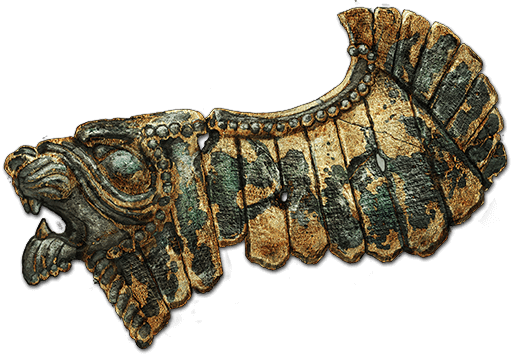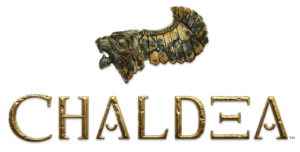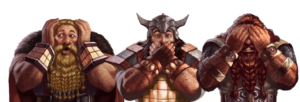C H A L D E A N O R C S
Orcs are an extraplanar species of humanoids not indigenous to Chaldea. At a distance they appear unremarkably human—bipedal and roughly the same body height and weight; arms and legs equal to that of humans. They have body hair like humans, mostly on their head. The male of the species can also grow facial hair.
At closer inspection, one can quickly spot the differences between orc and humans. The orc physique differs significantly from that of humans in their torso muscle structure, their abdominal core muscle groups run vertical from the pelvis to the chest. Bare, the orc ropelike attenuated muscles are decidedly non-human.
Orc facial characteristics are sharper and stronger than humans. They are a predatory meat-eating species and their senses reflect this evolution; their eyes are large with adaptive night vision allowing them to see in complete darkness; their ears angle sharply up with large ear pits providing highly attuned hearing. Their mouths are filled with triangular serrated teeth they continually shed and rapidly regrow as they fight and feed. Orc skin generally lacks pigment and appear quite pale, almost white having spent most of their lives in caves and subterranean caverns away from the sun. While they might appear albino, they are strictly not albino, as they do have eye and hair coloration.
Orcs and humans are breeding compatible.
The Claw Hammer Incursion
Orc mercenary armies were brought specifically to Chaldea by the elder dragons during the Claw Hammer War to fight the dwarves. Naturally equipped and adept at fighting subterranean battles in difficult underground environs, orcs were a perfect foe to throw against the dwarves who had burrowed far under the Divinity Mountains to escape the dragon violence. Eager and full of hostile intent, the orcs absorbed dragon hatred for dwarves, took that hatred, twisted it and made it their own. On Chaldea it was their mission, their life’s pursuit to annihilate the dwarf infestation. This solitary task they took, “kill the dwarves” and refined it into a lifestyle. Led by Sureniel, the orcs attacked the dwarves which became the turning point of the war.
Following the climax of the Claw Hammer War, the Elder Dragons interest in the dwarves sated, spoils rounded up and consumed, took their leave returning to their homes elsewhere across the Great Sea. Dragons disappeared from worldview and politics.
The Great Diaspora
The scattering of the mercenary armies across Chaldea, the era known as the Great Diaspora lasted nearly three centuries, the migration period over which species and ethnic groups settled in the various regions of Chaldea. At the end of the Claw Hammer, hundreds of derelict military units were left in neglect the world over, some were wiped out by competitive species and other tried to travel to where others of their kind were to create the foundation of where that species or ethnic group took root.
Mercenary armies of orcs built for a single purpose languished, leaderless, no more dwarves to point their finely focused loathing toward, ultimately turned to infighting and squabbling.
Mercenary armies of humans were quicker to adapt, ignored by the dragons they quickly organized and establish towns and trade and forged a burgeoning civilization. Chaldea was a fertile world with no natural predators, save those that the dragons had brought with them. Humans, as a species, were naturally more open to law and order, under this new world order humans flourished. But as humans made good, orcs struggled and took to raiding human settlements. Humans and orcs were constantly at each other’s throats, warring, and endless bloodshed—orcs are rapid breeders and the humans quickly learned they couldn’t kill fast enough get rid Chaldea of the damn orc pest. So they drove them back into two major conclaves, Divinity Mountains and Hills of Hatred. Bands of orcs ran wild in Somarria, as humans had no interest in those wild lands.
Niesse is the kingdom of orc in Chaldea, ruled by Sureniel, an elder diamond dragon.
After the Claw Hammer War, when Sureniel’s sister and brothers receded from the world, he elected to stay in the Divinity Mountains whereupon he established the Niesse Nation of Orc. Humans quickly learned the wisdom of steering clear of the Divinity Mountains and the five dwarven citadels the orcs annexed with Sureniel’s aid. Brieg, Bruun, Gloggu, Gorgbast and Mollwitz became orc icons of war and hate.
Deep within the Divinities, Sureniel’s hate smoldered like a hibernating mountain slowly building volcanic pressure. While other dragons slumbered, Sureniel persisted, driven by animosity and desire that had not been quenched even after the dwarves had been defeated and the war over.
Aimless and unfocused, Sureniel corralled orcs and through terror, pain, and intimidation, established a subterranean empire with the orcs as the lynchpin. Breeding pits soon churned at full capacity, filling nurseries with legions of hate fueled orcs. Sureniel established the “Blood Summoners”, a cabal of blood ritualists who tapped into Chaldea’s potent magics, summoning off-world monstrosities for the purpose of stocking a militia menagerie.
It has been centuries since any firsthand eyewitness accounts has seen behind Niesse’s shrouded veil of secrecy. A lot can happen in a thousand years.
Kordavan Empire
The kingdom of Niesse is officially part of the Kordavan Empire. How this political arrangement came to be is unclear. Kordaava’s legions never marched into Niesse. And as far as anyone knows, neither his armies nor his drasildar ever met on the battlefield with orcs, (outside of occasionally skirmishes).
While Kordaava built his empire, a few Elder dragons had refused to kowtow to the upstart dictator’s demands. In a show of force, they were slain by drasildar – brutally decapitated – their heads prominently put on display in Saratof.
Its assumed, Kordaava and Sureniel must have come to amicable agreement, but this is unconfirmed. In the time of Kordaava, orcs have been left virtually unmolested in Niesse to tune their domain of hate.
C H A L D E A P E D I A










